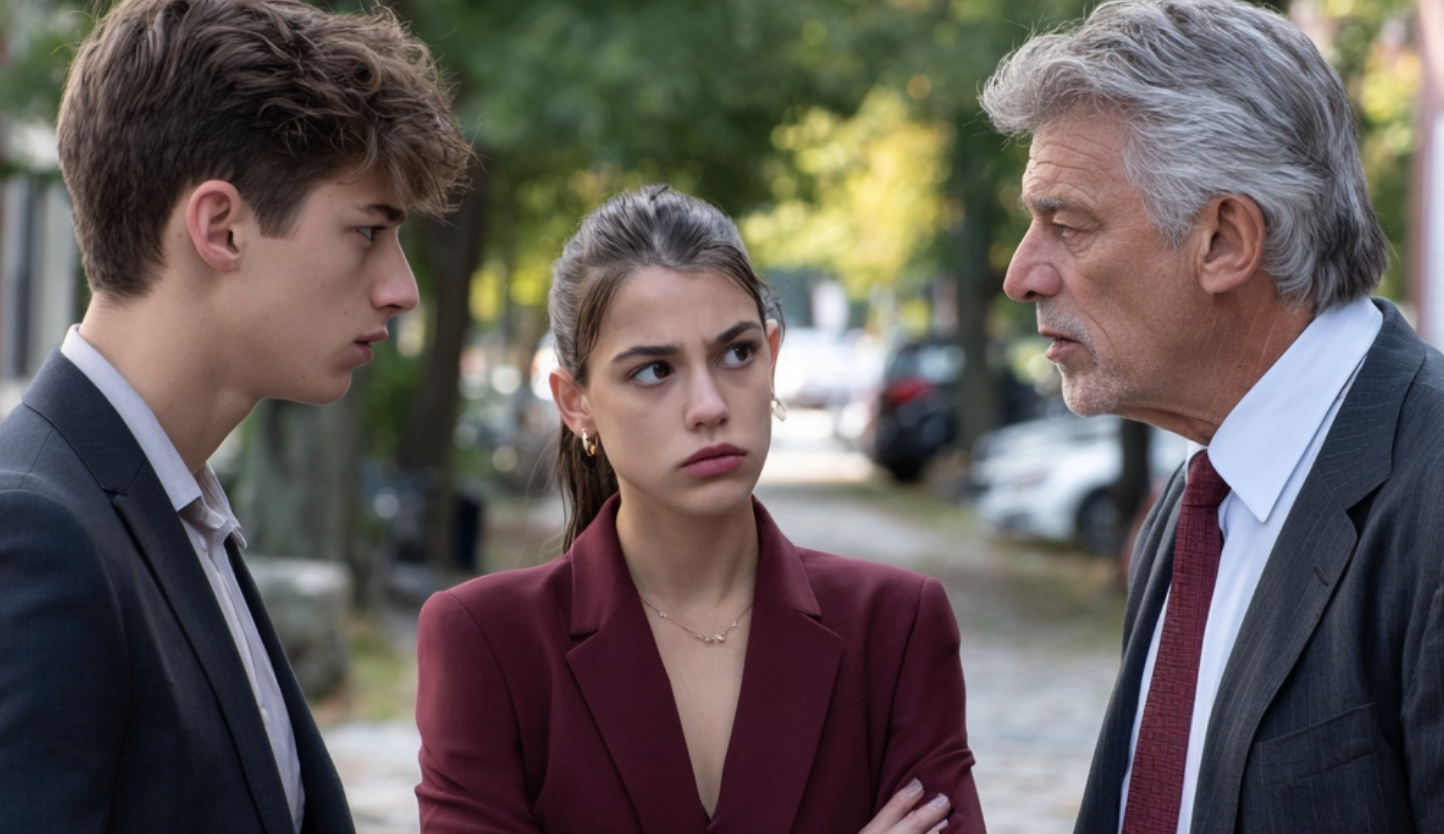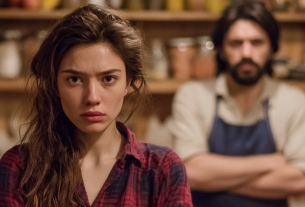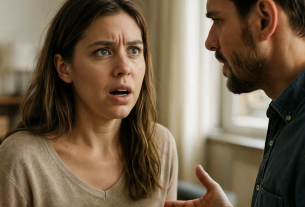Oleg sat at the very back desk in the stuffy lecture hall, wilting from the heat and the lecturer’s monotonous droning. May was in full swing—so were the last semester, the last lectures, the final hours before long-awaited freedom. A lazily humming fan barely pushed the warm air around; it felt more like a reminder of the coming June than any relief from the swelter.
Trees were green outside the window, and one thought kept circling in Oleg’s head:
“Finish the thesis—and I’m free. Break into IT—the real life begins.”
Beside him sat Kirill, his best friend, with the face of a man doomed to a slow death by boredom. He was sketching a monster in his notebook and occasionally shot Oleg a look full of the silent question: “When is this going to end?”
Suddenly the door creaked open, and the dean’s assistant walked in. The students stirred. The girl in a white shirt, clutching her ever-present notepad, swept her gaze around the room:
“Guys, we have a small request. The shelter out by Chashcha is asking for help again. The university collected food packages—we need someone to deliver them. Anyone with a car?”
Oleg glanced at Kirill. As if he’d been waiting for it, Kirill perked up at once:
“We’ll go.”
“We?!”
“Of course! We’ll get some fresh air. And escape this sauna.”
Oleg smirked and raised his hand:
“The two of us. We’ve got a car.”
The assistant thanked them, handed over a list and an address. While the others buried themselves in their laptops again, the friends slipped outside, gulping the cooler air.
“Thanks, man,” Kirill exhaled. “I thought I’d suffocate from boredom.”
“Yeah, now it’s just a free charity run. I hope it’s not worse than I’m imagining.”
“A shelter is a shelter. Not a five-star hotel.”
They climbed into the old Kia that Kirill had bought with scholarship money, odd jobs, and a little help from his parents. The drive started off almost like a getaway: the road wound through forests, pines mixing with birches, the occasional house appearing; the air smelled like the dacha in childhood.
But everything changed as soon as they turned onto a narrow lane and saw the rusty gates marked: “Children’s Home No. 14.”
Beyond lay a bleak sight: two sagging buildings, peeling walls, a half-collapsed fence, and cardboard where windowpanes should be. The air was heavy, with a bitter tang of damp.
They were met by a silent guard of about fifty, in a worn uniform with a cigarette in his teeth. Without a word, he nodded toward the administrative building—apparently that’s where they needed to go.
“Feels like a Gulag movie,” Kirill whispered.
“Don’t joke,” Oleg said. “Kids live here. Look at the windows…”
Inside was even worse. Gray walls, mold stains, floors that creaked. Dirty rugs that hadn’t seen cleaning in ages lay in the corners. In one corner—a battered cabinet with empty shelves. The only light was a dim bulb. From the next room came a thin, stifled child’s sob.
Oleg felt something clench inside. He wasn’t sentimental, but what he was seeing stirred up something heavy in him. Kirill’s face darkened too.
“It’s not supposed to be like this…” Oleg said. “This isn’t just poverty. It’s… neglect.”
They handed over the boxes of food and were about to leave when a little boy in torn sandals and a worn-out T-shirt darted out from around a corner. He ran straight into Oleg, grabbed his shirt, and looked up with big brown eyes:
“You’re my dad. I’m Dima Karnaukhov. I’m four years and three months old.”
Oleg’s heart stopped. He knelt, not knowing what to say. Behind him, Kirill stood frozen.
“No, kiddo… I’m not your dad. But I’m a good guy. I brought you food and toys.”
“Can I show you my box?” Dima whispered. “That’s where my secrets are.”
Oleg nodded. The boy led him to his room—a tiny space with a cardboard box in the corner. Inside were three broken toy soldiers, a car with no wheels, and a dried pinecone.
“This is the cah, this is the captain, and this is a pinecone rocket. I’ll fly home on it when I grow up.”
Oleg clenched his jaw. He crouched down beside him and said quietly:
“You’re very brave, Dima. And kind.”
“Will you come again?” the boy asked, peering into his eyes.
“I promise. I’ll definitely come back.”
They returned to the corridor. Kirill was waiting, motionless. At that moment a woman of about fifty came out of the director’s office—wearing a gaudy housecoat, cheeks slick with sweat, and a cloying smile.
“So, boys, thank you for your help! Delivered everything, all the paperwork done?”
“Yes,” Oleg answered. “Only—may I ask—where do you store the food?”
“There’s a pantry,” she nodded, “only it’s closed today. I’m keeping it in my office for now.”
Oleg peeked inside. There were the boxes: buckwheat, cookies, oil, condensed milk—everything the university had sent for the children. Next to them—an unfinished coffee, pastries, and Marlboro cigarettes.
Oleg understood—something was off here.
“So, for the children?”
“Of course! I’ll hand it out tomorrow!”
He walked out without a word, his fists clenched so tight his knuckles went white.
“Did you see?” he ground out to Kirill. “She’s hiding the aid for herself. Just stealing it.”
“What a piece of work.”
“I’m not leaving it like this,” Oleg said firmly, pulling out his phone.
That night at home, he couldn’t sleep. He kept seeing Dima’s eyes, his “treasure” box, the smell of rancid oil and condensed milk on that desk. He tossed and turned a long time before finally sitting down at his laptop.
“What are you doing?” Kirill poked his head out of the kitchen with a mug of tea.
“I’m going to write. A call to action. Let’s call it ‘a cry from the heart.’”
“What call?”
“We’re IT guys. If we can’t do it alone, we’ll organize help online.”
Oleg opened a group on social media and uploaded photos from his phone: cracks in the walls, holes where windows should be, Spartan beds, broken toys. And at the end—a photo of Dima smiling at his toy soldier.
The caption was simple:
“Today we were at a children’s home. Kids live here. They’re fed what’s left after greed. They have no toys, little food, no chances. But they do believe adults can be kind. If you can—come. Not money, not transfers—come in person.
Address: Shelter No. 14 near Chashcha.
We’ll be back on Saturday.”
He hit “Publish,” then paid for reposts in local groups. Some helped for free—because it hit them.
Peeking over his shoulder, Kirill snorted:
“You hero, you. Keep it up.”
“I’m not a hero. I just couldn’t keep quiet. What I saw there ripped me up inside.”
By the next day the post had over fifty comments. By evening there were two hundred. On the third day people started responding—included former residents of the home. One of them, now the owner of a car wash in a neighboring city, wrote:
“We’ll bring three guys, we’ll handle the wiring. Thanks for raising this.”
An elderly shop teacher called:
“Son, I may be old, but my hands remember how to work. I can gather a team of helpers.”
Oleg hadn’t expected such a response. His words—simple and honest—set off a chain reaction. People wrote from other towns, offered building materials, clothes, even a professional chef’s services. He could feel that something was beginning to change.
On Saturday three cars pulled up to Shelter No. 14 at once. Young guys got out of the first with cans of paint and tools. From the second came men around forty, unloading sheets of drywall. And from the third—a girl in a green windbreaker, hair pulled tight in a ponytail, with a gaze that made even the air feel denser.
She stopped at the gate and said loudly:
“Open up! I know you’ve stashed everything for yourselves again! I don’t care who’s covering for you. This used to be my father’s shelter. And I’m going to change everything.”
Lyudmila Stepanovna—the director—darted out of the building. Her smile was as fake as everything around her, like she’d stepped out of an old horror story.
“How dare you? Who even are you?”
“I’m Svetlana Anatolyevna. The founder’s daughter.”
Oleg, who was standing nearby, walked up slowly:
“She’s right. We were here a week ago. All the food boxes ended up in her office, next to coffee and cigarettes.”
“You… you’re lying!” the woman screeched, but no one cared about her voice anymore.
Someone pulled out a phone and started filming.
Svetlana turned to Oleg:
“Thank you. You’re from the university?”
“Yes, my name is Oleg. My friend and I brought aid, but we couldn’t just walk away.”
“I’m glad you couldn’t.”
Her face didn’t fit magazine beauty standards: a prominent nose, thin lips, slightly strong features. But her eyes held something greater—warmth, resolve, and an inner strength, as if she’d been through her own trial and come out of it only stronger.
She wasn’t wearing designer clothes, didn’t smell of expensive perfume. Just a windbreaker, sneakers, and purpose in every movement. Oleg looked at her with a new understanding—respect.
“I came back from London,” she said. “My father—Anatoly Viktorovich—his foundation once created this shelter. Now I see what it’s become. If I have to, I’ll live here until we fix it.”
Oleg nodded. Kirill scratched his head thoughtfully:
“What if we really help? Not just drop by now and then, but get organized for real—a plan, a schedule, the work?”
That’s how a real volunteer campaign began.
One of Oleg’s favorite childhood heroes used to say, “If you start something, see it through.” And here it was—the moment when those words stopped being just a line.
He decided to try something unusual. Calling out to the kids who’d run over, he announced in a booming voice:
“Guys! Who wants the most important and responsible job?”
“Me! Me!” they shouted in chorus.
“Then listen carefully: only the most reliable get to paint the fence. This isn’t just painting—it’s a mission. Only those ready to work seriously.”
The boys swarmed the paint bucket. Fifteen minutes later the fence was blazing in every shade of blue and green. One plank, by accident, turned purple.
“I want to make a rainbow!” a little girl with braids yelled.
Dima joined in too. He grabbed a brush, dipped it in paint, but slipped and fell with a crash right into the bucket.
“I’m the paint!” he declared, smeared head to toe, blissfully happy.
Laughter rolled across the yard. Even Kirill couldn’t help himself.
“Tom Sawyer’s got nothing on you,” he said. “Looks like you’re a born teacher.”
A few days later Oleg was riding the bus to the university. A couple sat down beside him—a woman in a modest dress and a man with a kind but tired face. They were silent for a while, then the woman whispered:
“Maybe we should try again? I feel like he’s waiting for us somewhere…”
“Tanya, how long can we keep this up? We’ve been trying for seven years. How much have we spent on IVF?”
“But what if… we just looked in the wrong place?”
Oleg froze. Something clicked inside: “It’s them. This is a chance.”
He turned to them:
“Sorry for overhearing. But there’s a little boy. He’s four. His name is Dima. He lives in a shelter, and every day he asks, ‘Where’s my dad?’ Maybe just go. Take a look.”
The man pressed his lips together. The woman put her hand to her heart.
“Where is it?”
“Shelter No. 14, near Chashcha. I’ll write down the address.”
Oleg quickly scribbled the details and handed them over.
“Thank you,” the woman whispered. “We’ll definitely come.”
The bus stopped; Oleg got off. Inside he felt something strange—like he’d truly done something that mattered. Not for glory, not for applause, but because he couldn’t do otherwise.
A month passed. The air in the shelter felt different—no longer damp and moldy; it smelled of fresh paint and homelike comfort. The bedroom walls had been repainted in light colors, children’s drawings appeared in the corridors. On each one—sun, flowers, stick people with the captions “mom,” “dad,” “dream.”
The cafeteria, which had once felt like a soulless institutional room, now filled with the aroma of stewed meat and homemade pies. The children ate quietly, as if not believing the food was real and no one would take it away.
Lyudmila Stepanovna had noticeably deflated. She hardly left her office, appearing only occasionally at meetings to say that “everything is under control.” But now her voice sounded unsure, like someone who’d lost her footing.
Svetlana, on the contrary, had become the center of things. She walked around with a notepad, checked purchases, helped with repairs, offered advice. No one had elected her leader, but everyone listened. She didn’t bark orders, yet her authority was unquestioned.
One day Oleg approached her:
“Still haven’t decided whether to tell your father or not?”
“I don’t know,” she admitted honestly. “He thinks I came back because of memories. If he finds out I tracked down Lyudmila and started changing everything… I’m afraid he’ll explode.”
“Maybe he should find out?”
“Maybe. Just not from me.”
She left, trailing a shadow of thoughtfulness.
Meanwhile, far away in London, in a luxurious office on the 15th floor, Anatoly Viktorovich was reading a security report.
“Ordinary guy, provincial,” the aide reported. “IT student, lives in a dorm. No connections, no money.”
“And why is he around Sveta?”
“They’re together a lot. He’s very active in the shelter’s restoration. Reviews say he’s initiative-driven. And he seems intelligent.”
“Oh really?” the father smirked coldly. “When you have nothing and you get close to a billionaire’s daughter?”
“Perhaps his intentions are serious,” the aide ventured.
Anatoly Viktorovich closed the folder and stood up:
“Then I’ll go myself. I want to see this… hero. I’ll give him an exam.”
That same day Oleg was coming back from the store. Bags of groceries in his hands, thoughts of Svetlana in his head. He remembered running into Marina recently—the one who’d called him “weird” for helping kids.
“Hey, where’ve you been?” she’d asked, smelling of expensive perfume.
“At the shelter.”
“Ugh, how awful. You’re as incomprehensible as ever.”
He hadn’t answered then. But now he understood: in Svetlana was everything he’d found missing in Marina. Genuine warmth. Simplicity. Honesty. With her he didn’t have to pretend, play roles, prove anything. With her he was himself.
At his building entrance he stopped and typed a message:
“Sveta, can we talk?”
“Of course, Oleg. What’s wrong?”
He took a deep breath:
“I… don’t know how to say this. Maybe it’s strange. And I’m not good with words. It’s just… I love you. Not like in the movies, for real. Probably from the day I saw you helping Dima.”
There was a pause. One second. Two.
“I love you too. From the moment you took his hand.”
Oleg smiled. He knew this was right.
Two days later they were standing in line at the registry office. No fuss, no flashy luxury. They simply filed the application. Instead of rings—two paper number slips.
“Are you sure?” Oleg asked as they signed the documents.
“Yes. Even if the whole world is against it, I’ve already chosen. I said ‘yes’ long before we ended up here.”
He looked at her—jeans, messy hair, no makeup. But there was more in her eyes than in all her father’s vaults. He knew: with this woman he was ready to go through anything. Through any trials. Through any mistakes.
When they left the registry office hand in hand, Kirill was filming them. Friends shouted “Kiss!”, someone took pictures, someone just smiled.
“So,” Oleg grinned, “shall we celebrate at a restaurant?”
“Absolutely not,” Sveta said firmly. “We’re going to McDonald’s. They have the best pies in town.”
They were about to cross the street when a whole column of black SUVs screeched to a halt. A driver in a sharp suit got out of one and opened the back door. Onto the sidewalk stepped Anatoly Viktorovich—long coat, severe expression, not a hint of joy.
“If my daughter has decided,” he said loudly, looking around, “I won’t stand in the way. Congratulations to the newlyweds.”
He extended his hand to Oleg.
“Welcome to the family. Just don’t let me down. Otherwise you won’t even realize before you’ve turned to dust.”
A little taken aback, Oleg still shook his hand. Svetlana frowned but didn’t flinch. Kirill, standing next to them, snorted:
“Was that a serious warning or a line from an action movie?”
“That was life, bro,” Oleg murmured, hiding a smile.
A week passed. The morning was quiet and clear. Outside the shelter, children were drawing on the asphalt while Oleg and Svetlana stood by the entrance, arms around each other. At that moment a car pulled up to the gate with license plates that drew instant attention.
A Maybach. Out stepped Anatoly Viktorovich. Impeccably dressed, gaze hard, but his face showed a slight softening. Beside him walked a man in uniform carrying a folder.
“Time to put things in order once and for all,” he said, coming closer.
Without delay, he turned to Lyudmila Stepanovna, who was just coming out with papers:
“You are under arrest for abuse of office. Please accompany the officer to process the documents.”
“What?!” the woman screeched. “This is absurd! I can explain everything! They set this up themselves!”
“Explain it at the station,” the uniformed man replied calmly.
Lyudmila looked around. She looked at the children, at Oleg, at Svetlana… Then she slowly sank onto a bench. But no one was listening to her excuses anymore. An era was ending—the era of corruption, indifference, and hypocrisy. And the beginning of something new was just starting.
Svetlana was trembling, and Oleg squeezed her hand tighter. It had all happened quickly but left a strange feeling—like an old splinter had been yanked out, the one you’d long wanted to remove but feared the pain.
“Thank you, Dad,” she whispered. “I thought you wouldn’t get involved.”
“I was just waiting for you to figure out for yourself who’s a friend and who’s a leech,” he answered quietly. “You’ve grown up. Now you can make decisions on your own.”
But that was only the day’s first surprise.
Ten minutes later a silver Kia pulled up to the gate. A man and a woman got out—the very ones Oleg had seen on the bus. Tanya and Igor.
Dima, who’d been playing near the swings, turned and froze. Slowly, carefully, he walked toward them. Igor crouched down to the child’s level.
“Hi, Dima.”
“Hi… Who are you?”
“We’re the ones who’ve been looking for you. We’ve been waiting a very long time.”
The boy reached for his hand, peered into his eyes. Then he turned to Oleg:
“Is it them?”
“Yes, kiddo. These are your parents. Ready?”
“Yes,” he said firmly, showing his toy. “I’ve got a magic rocket. Are we going home now?”
“Of course,” Oleg smiled. “You’re starting a new life.”
Sveta couldn’t hold back her tears. The volunteers around them fell silent. This was the very moment it had all been worth fighting for. The reason it mattered for them all to be here.
The third surprise came a bit later—at a festive table set up in the renovated playroom. With music, laughter, and the smell of fresh cake, Anatoly Viktorovich spoke again:
“Since you’ve decided to live like adults, you should take on real responsibilities.”
He handed Svetlana an envelope:
“From today you officially head the shelter. Thirty-two employees, an annual budget, and all my support. Just don’t repeat this woman’s mistakes. These children deserve better.”
Sveta nodded silently. Tears filled her eyes—but now from relief and pride.
He handed a second folder to Oleg:
“And you—director of a new foundation. Call it what you want, decide where the help goes: shelters, education, medical support. There’ll be plenty of work.”
“I’m not sure I’m ready,” Oleg admitted honestly.
“No one ever is,” said Anatoly Viktorovich. “But you’re not afraid. That’s already half the battle.”
Oleg looked over at Sveta. At Dima, laughing with his new parents. At the friends who’d painted the wall with him, at the children’s drawings where mold used to be. He took a deep breath.
“Thank you. We won’t let you down.”
“I know,” her father nodded. “One more thing.”
He took out keys:
“This is a house. Renovated, furnished, with a kettle on the kitchen counter. The car will be at your door. And I’ve set up two small production facilities: one for your projects, another in case of unforeseen circumstances. Don’t thank me. Just live with dignity.”
He hugged his daughter, pulling her close.
“The world needs you. However grand that may sound. And I need you too.”
Sveta nodded, leaning into him.
Outside, the children were playing ball; Dima was already telling his mom about his rocket and the dog they’d definitely get. Kirill brought out a second cake. Everyone laughed, took pictures against the refreshed facade.
Life went on.
But now it was different—real, honest, and filled with meaning.



